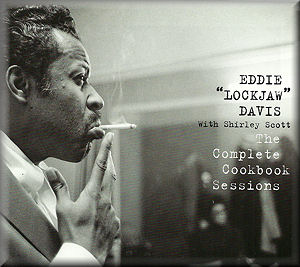CD1
1.
The Chef
2. Have Horn Will Blow
3. In the Kitchen
4. But Beautiful
5. But Beautiful (alt. take)
6. Three Deuces
7. Tangerine
8. Pots and Pans
9. Old Devil Moon
10. I'll Never Be the Same
11. I Let a Song Go Out of my Heart
12. You Stepped Out of a Dream
13. It's a Blue World
CD2
1. Blue Lou
2. Avalon
3. Too Close for Comfort
4. Willow, Weep for Me
5. But Not for Me
6. Strike Up the Band
7. I'm Just a Lucky So and So
8. Body and Soul
9. Pennies from Heaven
10. The Broilers
11.The Goose Hangs High
12. Simmerin'
13. Heat `n' Serve
14. My Old Flame
15. Serenade in Blue
CD3
1. Stardust
2. High Fry
3. Skillet
4. Smoke This
5. I Surrender Dear
6. Jaws
7. The Rev
8. It Could Happen to You
9. What's New
10. The Very Thought of You
11. The Man I Love
12. Smoke Gets in Your Eyes
13. I Cover the Waterfront
Eddie "Lockjaw" Davis - Tenor sax
Shirley Scott - Organ, piano
George Duvivier - Bass
Arthur Edgehill - Drums
Jerome Richardson - Flute, tenor sax, baritone sax (CD1 tracks 2-6; CD2 tracks 10-14; CD3 tracks 1-7)
Talk about embarras de richesses! This triple CD collects together all the tracks recorded in 1958 and originally released on five LPs (which were called The Eddie "Lockjaw" Davis Cookbook, vols. 1-3, Jaws and Smokin'), plus the other tunes recorded at the same sessions. The tunes are presented in the order in which they were recorded. To all these is added a quartet session from 1960 with Shirley Scott on piano instead of organ. It is almost too much to take in, and is certainly not designed for listening at one sitting.
However, one can hardly have too much of Eddie "Lockjaw"
Davis's growling, meaty tenor sax, especially when multi-instrumentalist
Jerome Richardson is added for most tracks. Many of the tunes are
blues, which show Davis to good advantage, as he is essentially a
bluesy player. Eddie is best-known from his booting tenor solos on
Count Basie recordings, but this album allows him to show his versatility
in various styles - and especially his ability to interpret ballads
sensitively and melodiously. And he keeps surprising us. For instance,
most musicians handle Body and Soul with kid gloves but Lockjaw
treats it as a cry from the heart, with George Duvivier underlining
it solidly and Shirley Scott adding interpolated chords.
Jerome Richardson's flute and baritone sax make useful contrasts with Eddie's tougher style, and on some tracks (e.g. Three Deuces) they work and spar together as two tenorists. I am less enthusiastic about Shirley Scott's organ playing, as her style is very chordal and only sometimes resorts to single-note lines. Besides, the tone she gets from the organ can be rather cavernous. Unlike most Hammond organists who supply bass backing with the organ pedals, Shirley leaves the bass line to George Duvivier - which is fine, except that you miss the deep thrust that the organ pedals can give. In a way, Shirley is preferable when she switches to piano for the 1960 session, as her economical contribution adds to the clarity of Lockjaw's playing.
The album title of the Cookbook Sessions was well chosen, as Lockjaw could certainly cook with gas when he wanted to. But these recordings prove that he was equally able to play slow numbers with feeling and imagination.
Tony Augarde
